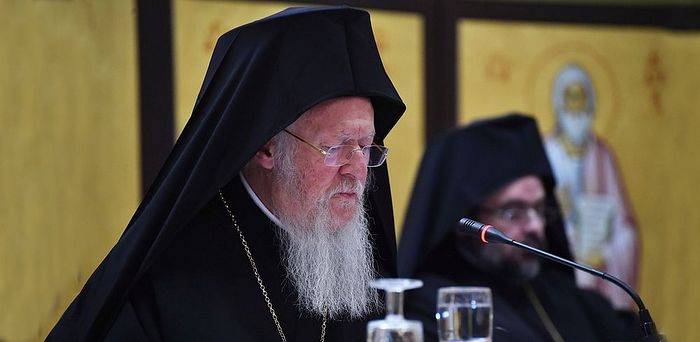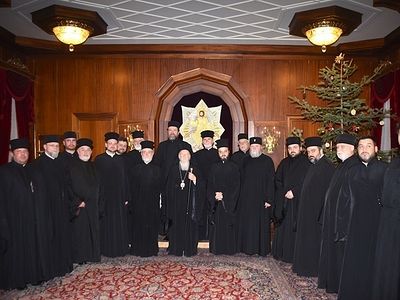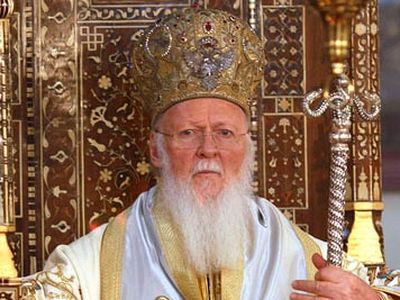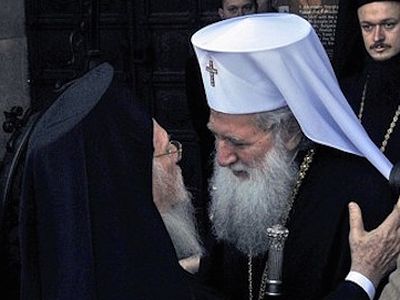Source: Basilica News Agency
January 22, 2016
The synaxis of the primates of the Orthodox Churches is underway, from January 22-27, 2016 at the Orthodox Center of the Ecumenical Patriarchate in Chambésy.
At the opening of the event, His Holiness Bartholomew, Ecumenical Patriarch of Constantinople, delivered a speech thanking the other primates of the Orthodox Churches as well as the delegations for accepting the change of place for the synaxis from the Ecumenical Patriarchate’s residence in Istanbul, Turkey, to the Chambésy center, which is “meant for serving pan-Orthodox unity, and which for a long time has hosted and still hosts many inter-Orthodox and pan-Orthodox meetings.”
Next, the Ecumenical Patriarch referred to the themes that will be discussed at the Holy and Great Synod, which were established at the first presynodal Pan-Orthodox Conference of 1976, namely:
- The Orthodox Diaspora;
- Autocephaly and the manner in which it is to be proclaimed;
- Autonomy and the manner in which it is to be proclaimed;
- Diptychs;
- Common Calendar;
- Impediments to marriage;
- Adaptation of fasting ordinances;
- Relations of Orthodox Churches with the wider Christian world;
- Orthodoxy and the ecumenical movement;
- Contributions of the local Orthodox Churches to the promotion of the Christian ideals of peace, freedom, brotherhood and love among peoples, and the elimination of racial discrimination.
Nevertheless, His Holiness noted that consensus hasn’t been reached on some themes during the meetings of the Commission for the Preparation of the Holy and Great Synod, thus asking whether the eight themes that were validated at a Pan-Orthodox level are sufficient for the agenda of the Synod, or is it necessary to postpone the convocation of the Synod until pan-Orthodox unanimity can be reached upon all the other themes (autocephaly, diptychs, impediments to marriage and common calendar).
The Holy and Great Synod is of direct and vital interest both for the Orthodox lay faithful, clergy and monastics, and for the rest of the Christian world
Emphasizing the fact that “the Holy and Great Synod is of direct and vital interest both for the Orthodox faithful, clergy and monastics, and for the rest of the Christian world,” His Holiness added that several other persons should attend the proceedings of the Holy and Great Synod as observers: both clergy, monastics and lay faithful of the Orthodox Church, and those of other Christian Churches or Confessions, found in dialogue with the Orthodox Church. The Ecumenical Patriarch offered as an example the fact that at the prcoeedings of the Second Vatican Council, the Orthodox Church delegated observers to attend the Council.
Referring to the fact that even before the meeting of the Holy and Great Synod, some “fighters for Orthodoxy” call it a robber council, the Ecumenical Patriarch asked what kind of authority will its decisions have, and what will be the canonical consequences for disobeying the decisions.
The Patriarch of Constantinople also spoke about the significance of the words "consensus" and "unanimity." Furthermore, Patriarch Bartholomew emphasized the fact that “if a synod meets under the threat of its dissolution, it had better not taken place” and referred to some Ecumenical Synods that met even when some local Churches were absent.
His Holiness addressed other practical details: the duration of the Holy and Great Synod and the establishment of a common secretariat of the Synod. The Ecumenical Patriarch proposed that the Pan-Orthodox Synod should be carried out for at least two weeks, and its works should be accompanied by Church services.
Finally, brethren, farewell. Become complete. Be of good comfort, be of one mind, live in peace; and the God of love and peace will be with you (2 Corinthians 13: 11) were the Biblical words with which His Holiness Ecumenical Patriarch Bartholomew concluded his speech.




